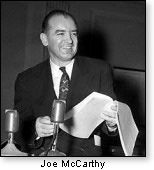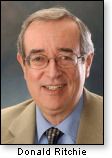The hearing containing these exchanges and related bits of by-play was shown on TV and thereafter re-broadcast in part by Edward R. Murrow on his CBS program, "See It Now." The thrust of this reportage was that Mrs. Moss was a pitiful, dazed and harried victim smeared by the nefarious McCarthy. Such also is the standard version of the matter found in countless histories of the era.
Unfortunately for the standard version, and for Mrs. Moss, she gave herself away in testifying-volunteering one of the addresses where she had lived as 72 R St., S.W., in the District of Columbia. This went to the question of whether she was the individual named by Markward, who had seen the Communist Party records but not Mrs. Moss in person. The question would be resolved four years later when the Subversive Activities Control Board (SACB) obtained the records of the D.C. party-and there found an Annie Lee Moss, of 72 R St. S.W., listed as a party member in the middle ’40s.
Proof Positive on Moss
These records made the matter quite open and shut, rendering moot attempts to discredit Mrs. Markward, argue that there were three different Annie Lee Mosses in the phonebook, and other such rhetorical smokescreens. Whether Mrs. Moss was as befuddled as she appeared, or had been recruited into the party without knowing what she was doing, are debatable issues. What isn’t debatable is that this particular Annie Lee Moss, and no other, had been listed in official Communist records as a party member. The Markward testimony to McCarthy was 100% on target.
Senate historian Ritchie’s take on all of this is of interest, as he is the authority everyone else is quoting. In a fairly lengthy discussion of the case, he throws in a 24-word reference to the findings of the SACB, but so handled as to becloud them. He says the board confirmed Markward’s identification of Moss, but immediately adds that "the board conducted no further investigation of Moss" and that thereafter it had said "Markward’s testimony should be assayed with caution." These comments can only suggest to readers that there is some serious doubt about the Moss case-the more so as Ritchie follows up with an extended eulogy to Moss offered by a liberal writer, attesting to her blameless nature.
These comments, however, are thoroughly misleading. For one thing, the point of this particular SACB inquiry wasn’t to investigate Moss, but to gauge the credibility of Markward. There was no intent or reason for the SACB to investigate Moss beyond the acquisition of the Communist Party records, so Ritchie’s gratuitous comment about "no further investigation" is a red herring. No such further investigation of Moss had been in prospect.




